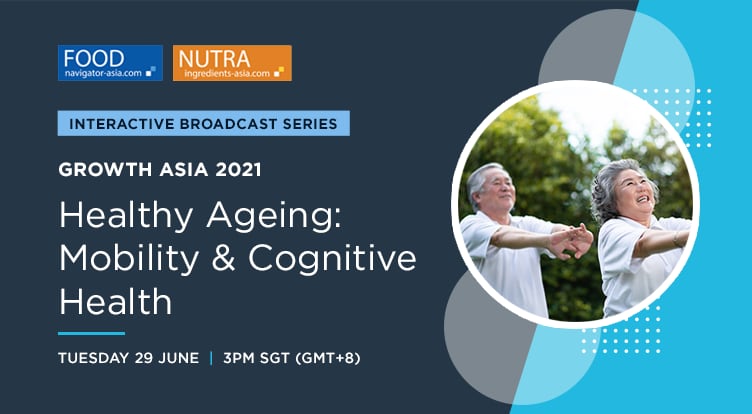These were the findings of a high-level panel discussion from our Growth Asia Interactive Broadcast Series 2021, organised by FoodNavigator-Asia and NutraIngredients-Asia.
The session on Healthy Ageing: Mobility and Cognitive Health was chaired by Gary Scattergood, editor-in-chief of both titles. (Listen on demand here)
The panelists were Dr Jin-zhong Xiao, Director of Next Generation Science Institute at Morinaga Milk Industry, Angus Brown, Co-Founder and CEO of Ārepa, Dali Ghazalay, Regional Director – Southeast Asia at the U.S. Dairy Export Council (USDEC), Ramasamy Venkatesh, Managing Director at Gencor, and Dr Shawn Watson, Founder and CEO of Senescence Life Sciences.
The session also included a one-on-one interview with Dr Shan May Yong, Principal Scientist at Brands Suntory, as well as presentations by Dr Matthew Pikosky, Vice President of Nutrition Research at the National Dairy Council and Dr Paul Clayton, a Fellow at the Institute of Food, Brain and Behaviour (Oxford).
Science
The panellists all agreed that a double blind, randomised controlled clinical trial (RCTs) provided the gold standard for all products.
Gencor is currently conducting RCTs on osteoarthritis and sleep, wile Morinaga Milk recently completed an RCT studying its probiotic strain, Bifidobacterium breve MCC1274 (B. breve A1) on improving immediate memory and delayed memory after 16 weeks of probiotic intake, among healthy older subjects with suspected mild cognitive impairment.
It is now working on a prototype based on this evidence and set to launch the product in the future with a registered health claim.
For Arepa, producer of nootropic products containing New Zealand blackcurrants, pine bark and L-theanine, the firm is deploying several double-blind crossover placebo controlled studies under four verticals.
According to Brown, the firm will study how the formulation can enhance focus and reduce stress under mental, physical and environmental conditions.
“We have found early stage evidence to show that our formula can inhibit the monoamine oxidase enzyme in the brain, known to break down neurotransmitters like dopamine. This type of oxidation is very common in conditions such as depression or Parkinson's,” he said.
Another research priority for Arepa was to study how the formula works not only in the short-term, but how it protects the brain in the long term: Brown added: “If we can delay the onset of normal neurological decline through accessible food that's natural and safe and scalable to the world, every year we save the world $2 trillion in economic burden.”
However, one challenge for cognitive studies is the long period of time needed to assess any effects, said Dr Xiao.
For nutritional supplements for mobility or cognition, Dr Watson added that there was a lack in mainstream adoption from healthcare practitioners.
He said most of the supplements available in the market were treating symptoms, instead of targeting the onset of disease.
“Certainly, the industry has come a long way with many double blind, placebo-controlled trials. I think the next step is to go from symptom modifying to disease modifying, some of these have great potential to show disease modifying effects.”
He cited Alzheimer's disease as an example, which typically starts years before the symptoms show: “We need to start developing science to show that we're actually modifying the course of the disease.
At Senescence, its proprietary formula NeuroSHIELD is based on the in vitro and in vivo work that the company did about a decade ago.
“We found that the lipid environments within neurons control conditions and problems including Alzheimer's disease.”
When taken daily, the formula is said to actively protects the brain from free radical attack, increases the cellular repair of lipids and promotes the export of inflammatory compounds from the brain. It helps enhance mental performance while reducing mental fatigue, supporting learning and memory, and promote healthy brain function.
In its product development, Angus said the firm lets the science dictate its direction.
New product development
For mobility, Ghazalay said food and beverage formulators were in strong positions to help consumers optimise protein intake through the development and introduction of wider choices of local friendly foods and beverages containing dairy proteins.
She advised manufacturers to consider the nutritional quality of ingredients.
“Not all protein ingredients are the same nutritionally, the quality of the protein can differ widely based on amino acid composition, digestibility of the protein and, and bioavailability,” Ghazalay said.
“So, the advantage of dairy based whey and milk protein ingredients are that they are nutritionally complete sources of protein, having the full array of essential amino acids required by the body.”
Another consideration for formulators is the taste profile.
“Consumers will not compromise on taste. So dairy protein has the advantage of having a neutral flavor profile which is important for consumers. Dairy proteins also offer opportunities through reducing the need for using food additives or flavour maskers especially when using plant or alternative proteins.”
It was also important to understand the functionality and versatility of the ingredient, such as whether it can fit across food and beverage applications in Western or Asian style.
In 2020, USDEC opened a center for dairy excellence in Singapore, which is an ideation and collaboration space for food and beverage manufacturers in South East Asia.
When developing products, another consideration is the delivery format.
Current popular formats in Asia are jelly and squeeze gels according to Venkatesh.
“We see that especially during this COVID-19 period, the demand for non-pill format has been growing throughout the whole of South East Asia.”
The delivery system is also important for manufacturers, especially with bioavailability widely in the industry with no uniform scale of measuring.
Venkatesh said, “The most common seems to be people talking about is how many times higher in bioavailability the nutrient is.”
Taking the example of curcumin, he added: “The only objective measure is how much curcuminoid gets into the blood, measuring the nanogram per milliliter of the actual substance in the blood.”
Citing the LipiSperse delivery system, created by its sister company Pharmako Biotechnologies, he stressed the importance of ensuring nutrients are not broken down by gastric juice in the stomach before reaching the target site.
Education and regulation
According to Dr Xiao, there was a huge potential for mobility and cognitive products especially in countries with an ageing society such as Japan.
Although Dr Watson observed that consumer education is still lacking in the APAC region.
“We need to be better at educating the population because brain ageing and brain health is something that a lot of people particularly in this region think that there's nothing they can do about and is just inevitable.
“In reality there's a lot of things we can do with lifestyle and nutrition, so we have to educate consumers first.”
The harmonisation of regulations for dietary supplements in ASEAN is another area which may prove challenging for small firms looking to enter into the region.
“If there was one single regulatory framework, it would really help innovations come to market quicker in this part of the world, especially South East Asia.”
The Growth Asia Series continues to July 15. Register for free here.




